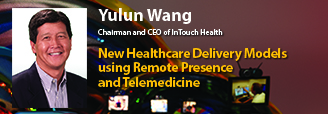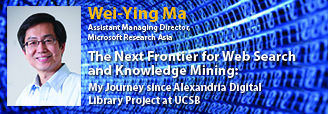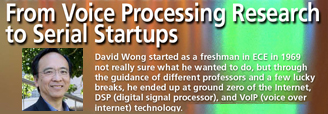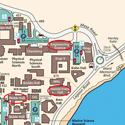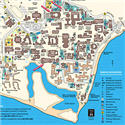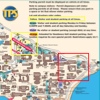ECE 50th Anniversary
ECE 50th Anniversary Lecture: "New Healthcare Delivery Models using Remote Presence and Telemedicine"
Yulun Wang, Chairman and CEO, InTouch Health
Friday, April 26, 2013 at 3:00pm
Engineering Science Building (ESB), Room 1001

Yulun Wang, PhD, is the Chairman and CEO of InTouch Health based in Goleta, CA. In 2002, Dr. Wang founded InTouch Health, a telemedicine company which pioneers remote presence robot systems that enable healthcare professionals to provide more effective and efficient healthcare by allowing them to “be in two places at once”. InTouch Health received Deloitte’s Technology Fast 500 Award as well as Inc. Magazine's Inc 500/5000 award rankings in 2008, 2010, and 2011. In 1989, Dr. Wang founded Computer Motion, the company which pioneered the surgical robotics market. Computer Motion went public in 1997 and merged with Intuitive Surgical (NASDAQ: ISRG) in 2003 for one third of the resulting company.
Dr. Wang will speak on how telemedicine is raising the quality and accessibility while reducing the costs of healthcare across the world through remote presence robotics. Dr. Wang will touch on healthcare challenges that we face today and how they can be lessened by technology advances in healthcare informatics, remote diagnostic and therapeutic tools, telecommunications, and robotics.
Dr. Wang has more than 50 publications and over 100 patents in the areas of robotics and computers. Dr. Wang is a member of the University of California Santa Barbara’s Electrical & Computer Engineering and Mechanical Engineering Advisory Board, the Hoag Memorial Hospital Presbyterian Board of Directors, the American Telemedicine Association (ATA) Board of Directors, and the National Academy of Engineering. Ernst & Young recognized Dr. Wang as an Entrepreneur of the Year Finalist. Dr. Wang also received the Venky Narayanamurti Entrepreneurial Leadership Award from the University of California, Santa Barbara. Dr. Wang is frequently invited to speak at noteworthy meetings and events, has appeared on the Today Show, CNN, in the New York Times and various other print and televised interviews. Dr. Wang has a Ph.D. in Electrical Engineering specializing in Robotics from the University of California at Santa Barbara.
 Video of Dr. Wang's Distinguished Lecture
Video of Dr. Wang's Distinguished Lecture
ECE Profile of Distinction
ECE 50th Anniversary Lecture: "The Next Frontier for Web Search and Knowledge Mining: My Journey since Alexandria Digital Library Project at UCSB"
Wei-Ying Ma, Assistant Managing Director, Microsoft Research Asia
Thursday, March 14, 2013 at 3:00pm
Engineering Science Building (ESB), Room 2001
My career in research started in 1994 when I was a graduate student in the ECE Department at UCSB. I was fortunate to be at the right place at the right time, when the National Science Foundation (NSF) selected UCSB as one of the universities involved in the Alexandria Digital Library (ADL) project and the Internet and digital media started to emerge and change the world. Thanks to Professor B. Manjunath, who was my advisor at the time, I was introduced to a research direction that would later become important to the industry and therefore opened up many great opportunities for me over the next 15 years. In this talk, I would like to share my journey since those days at UCSB and I will introduce what might be ahead for next-generation web search with a new mission to empower people with knowledge. As we enter the era of big data, this research area continues to be one of the most exciting and important areas, one in which we can develop technologies to change the world.
About Wei-Ying Ma:
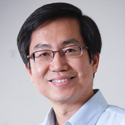
Dr. Wei-Ying Ma is an Assistant Managing Director at Microsoft Research Asia, where he oversees multiple research groups including Web Search and Mining, Natural Language Computing, Data Management and Analytics, and Internet Economics and Computational Advertising. He and his team of researchers have developed many key technologies that have been transferred to Microsoft’s Online Services Division, including Bing Search Engine and Microsoft Advertising. He has published more than 250 papers at international conferences and in journals. He is a Fellow of the IEEE and a Distinguished Scientist of the ACM. He currently serves on the editorial boards of ACM Transactions on Information System (TOIS) and is a member of the International World Wide Web (WWW) Conferences Steering Committee. In recent years, he has served as program co-chair of WWW 2008 and as general co-chair of ACM SIGIR 2011. He earned both a Master of Science and a doctorate in electrical and computer engineering from the University of California at Santa Barbara in 1994 and 1997, respectively.
 Video of Dr. Ma's Distinguished Lecture
Video of Dr. Ma's Distinguished Lecture
ECE 50th Anniversary Lecture: "From Voice Processing Research to Serial Startups"
David Wong, Chairman and CEO, D2 Technologies
Friday, November 2, 2012 — Reception at 10:00am | Lecture at 11:00am
Engineering Science Building (ESB), Room 1001
 David Wong started as a freshman at UCSB in ECE in 1969, not really sure what he wanted to do, except to take in as much education and good weather as he could. Through the guidance and inspiration of different professors, with a few lucky breaks, he ended up at ground zero of the Internet, DSP (digital signal processor), and VoIP (voice over internet) technology. After finishing his Ph.D., David worked as a research engineer on Voice Processing with a small team of grads and post-docs, and tried his hands at teaching at UCSB part time, much like any other young academic. During those 4 yrs as a research engineer and teacher, he received frequent invitations from research labs, universities, and industry; he knew that he had to choose a path forward some time. Eventually, the lure of building the first voice mail system based on the UNIX operating system and first generation DSPs was too much to resist, so he joined his first startup. After he completed all the technical work he committed to deliver for the voice mail company, and not satisfied to be just an engineer, he founded his own startup. Twenty five years later, he is on his fifth or sixth startup. He had some winners, he had some losers. It was a roller-coaster ride, and he missed some really BIG ones along the way. The journey continues. What will be next?
David Wong started as a freshman at UCSB in ECE in 1969, not really sure what he wanted to do, except to take in as much education and good weather as he could. Through the guidance and inspiration of different professors, with a few lucky breaks, he ended up at ground zero of the Internet, DSP (digital signal processor), and VoIP (voice over internet) technology. After finishing his Ph.D., David worked as a research engineer on Voice Processing with a small team of grads and post-docs, and tried his hands at teaching at UCSB part time, much like any other young academic. During those 4 yrs as a research engineer and teacher, he received frequent invitations from research labs, universities, and industry; he knew that he had to choose a path forward some time. Eventually, the lure of building the first voice mail system based on the UNIX operating system and first generation DSPs was too much to resist, so he joined his first startup. After he completed all the technical work he committed to deliver for the voice mail company, and not satisfied to be just an engineer, he founded his own startup. Twenty five years later, he is on his fifth or sixth startup. He had some winners, he had some losers. It was a roller-coaster ride, and he missed some really BIG ones along the way. The journey continues. What will be next?
 Video of Dr. Wong's Distinguished Lecture
Video of Dr. Wong's Distinguished Lecture
Wong's ECE Profile of Distinction
ECE 50th Anniversary Lecture: "California Coding: Early LPC Speech in Santa Barbara, Marina del Rey, and Silicon Valley and its Accidental Impact on the Internet Protocol"
Robert M. Gray, Professor, Electrical Engineering, Stanford
Friday, April 27, 2012 — Reception at 1:30pm | Lecture 3:00pm
Engineering Science Building (ESB), Room 2001

This talk sketches the historical and technical threads of the early development in California and elsewhere of what is now known as linear predictive coding (LPC) of speech. The focus is on the 1970s, but the story begins in 1967 and the narrative covers through 1982. Personalities, institutions, and milestones are considered along with technical developments and interpretations. The focal event is the first real time communication of understandable digital speech on a packet network, the ARPAnet, in 1974 — arguably the first Voice over Internet Protocol (VoIP), except that the IP did not yet exist. Most histories of digital speech emphasize the contributions of Bell Labs, for half a century the Valhalla of science, engineering, and technology. In fact, the early development of real-time signal processing on the Internet was accomplished by a small group of less famous institutions, including SCRL, UCSB, and CHI in Santa Barbara, USC ISI in Marina del Rey, and SRI (formerly Stanford Research Institute) in Menlo Park.
About Robert M. Gray
Robert M. Gray is the Alcatel-Lucent Technologies Professor of Communications and Networking in the School of Engineering, Emeritus, and Professor of Electrical Engineering, Emeritus, at Stanford University. He is a Fellow of the IEEE and the Institute for Mathematical Statistics and he was a 1981--82 Fellow of the John Simon Guggenheim Foundation. His professional awards include an Education Award, Meritorious Service Award, Technical Achievement Award, and Society award from the IEEE Signal Processing Society, a Golden Jubilee Award for Technological Innovation and the Claude E. Shannon Award from the IEEE Information Theory Society, and the Jack S. Kilby Signal Processing Medal and Centennial and Third Millennium Medals from the IEEE. He received a Presidential Award for Excellence in Science, Mathematics and Engineering Mentoring (PAESMEM). He is a member of the National Academy of Engineering.

